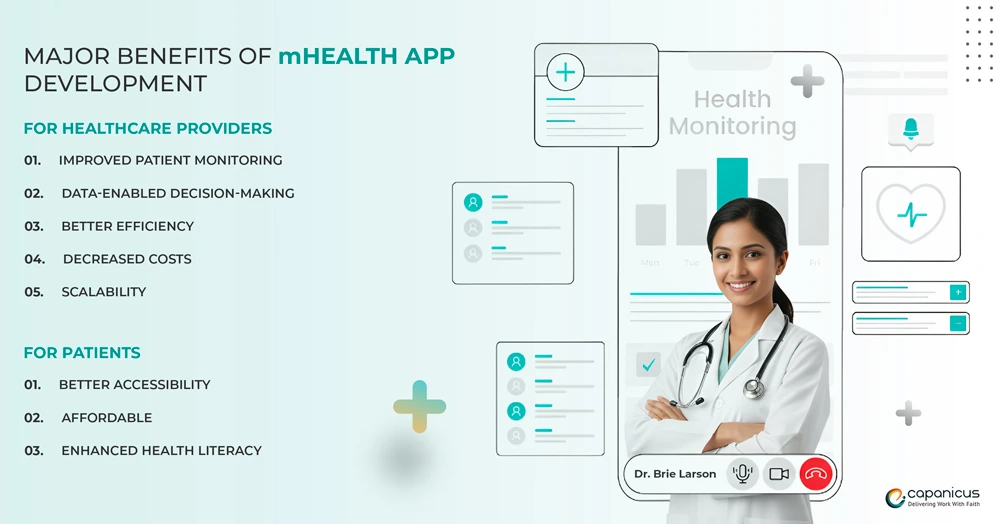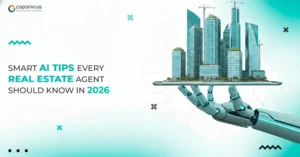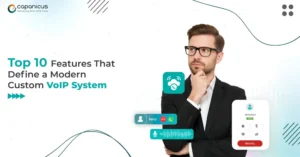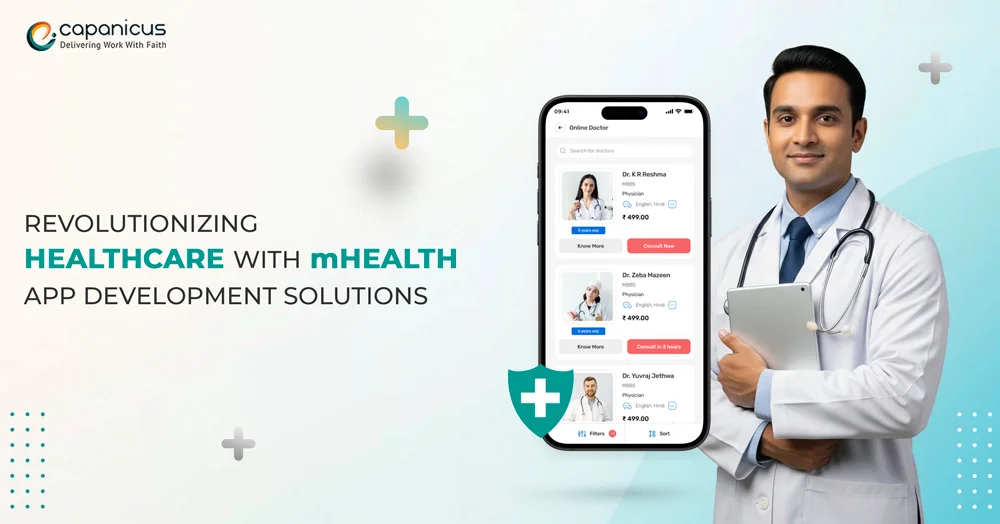
In this age of technology, patients expect healthcare services to be readily available to them in real-time and that too in a seamless manner. Keeping this in mind, healthcare providers need to change their approach accordingly for providing consultations, treatment, and other healthcare services to patients.
Here, mHealth apps come into the picture. They are making use of modern technologies like machine learning, artificial intelligence, wearable devices, and the Internet of Things to transform the healthcare landscape nowadays. They have made healthcare services easily accessible to patients from remote locations. Furthermore, they have improved the effectiveness of delivered healthcare. Moreover, the apps collect and track patients’ clinical information and data. Thus, they enable healthcare providers to extract key insights related to their health conditions. Resultantly, they can make decisions in an informed manner. This leads to precise diagnoses of patient conditions, quick interventions, and enhanced health outcomes in patients.
Furthermore, apps enable health practitioners to cater to an increased number of patients, improving the efficiency and effectiveness of delivered healthcare services. They can focus only on providing care to patients rather than performing administrative tasks. Due to the use of mobile health apps, the need for patients to travel to hospitals, clinics, and healthcare institutions to seek consultation, treatment, and follow-up has been reduced to a great extent. Moreover, they need not wait in long queues in clinics or hospitals. This leads to cost savings for both patients and healthcare-providing institutions, besides saving them time and hassles.
Are you a health practitioner or a healthcare business keen to venture into the world of mHealth App Development to offer better and convenient healthcare services to your remotely located patients? If yes, then you should have knowledge about what mobile health apps actually are. Moreover, you should know about different kinds of mobile health apps, associated features, benefits, and future mHealth application trends. This knowledge will help you choose the app that is the right fit for your healthcare practice/business needs with confidence and in an informed manner. You can then proceed towards your chosen app solution’s development and its integration into your existing workflows to transform your patient care and healthcare delivery services.
What are mobile health applications?
Mobile healthcare apps are a digital-driven tool that facilitates streamlined delivery of various healthcare-centered services with mobile-based phones and wearable devices. These services can include virtual consultations, monitoring of patients and their health condition, and management of medications prescribed to them. By connecting medical specialists, patients, and others, these applications are enabling digital transformation in the healthcare sector.
Various Types of Mobile Health Apps
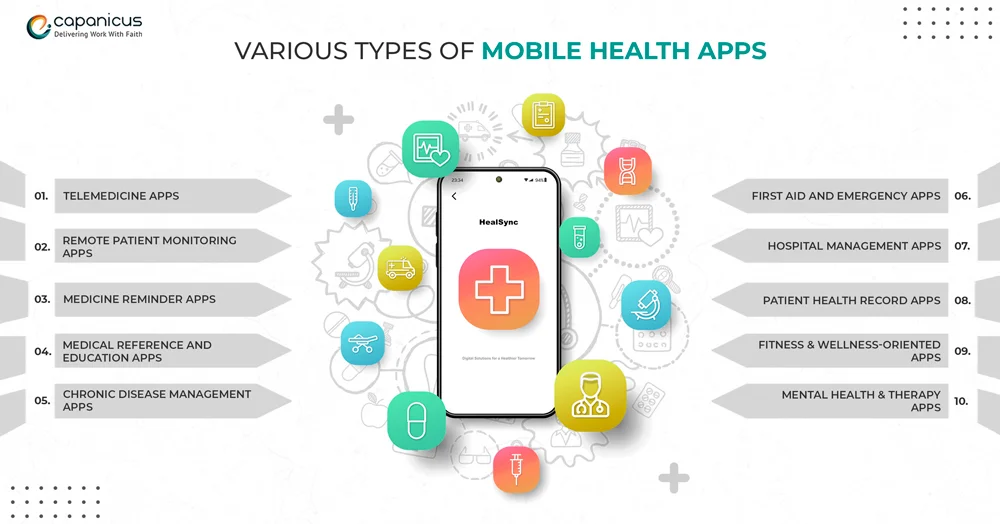
These are various types of mHealth apps that are commonly used.
Telemedicine Apps
Telemedicine apps enable patients to contact doctors remotely through voice calls, video calls, or chats. Therefore, they need not visit doctors’ offices for in-person visits. These apps make healthcare accessible to patients from anywhere and at any time.
RPM (Remote Patient Monitoring) Apps
The purpose of RPM apps is to gather and transfer real-time patient data to healthcare providers. This data pertain to vital parameters like heart rate and blood pressure. Moreover, they include glucose levels and sleep patterns. With the help of the data, health practitioners are able to diagnose any possible health risks early and they can intervene accordingly. The use of these apps eventually leads to better chronic disease management.
Medicine Reminder Applications
Managing a number of medications can confuse and overwhelm patients. Moreover, they can forget to take the medications. Medication reminder apps deliver automated reminders to patients in the form of notifications at the required time. As a result, they never miss a dose. Moreover, they alert patients about refills and track their dosages.
These apps promote enhanced medication adherence, which is crucial for patients with long-term health conditions. They are also beneficial for caregivers as they allow them to monitor whether their patients are taking prescriptions as per directions given to them. Healthcare providers can partner with a skilled and specialist mHealth Development Company to build medication management tools that help to improve safety and well-being among patients.
Medical Reference and Education Apps
Meant for medical students, healthcare professionals, and nurses, these apps enable them to access medical research, diagnosis tools, and drug databases. This consequently helps them in informed decision-making.
Chronic Disease Management Apps
These apps are created for patients suffering from various chronic disease conditions like diabetes and hypertension. Apart from offering personalized health recommendations, they also monitor symptoms in patients and record their medical readings.
First Aid and Emergency Apps
Besides offering step-by-step directions for the administration of first aid, these apps also provide medical contacts for emergencies and instructions for Cardiopulmonary Resuscitation (CPR).
Hospital Management Apps
Hospital management systems and apps allow medical facilities to deal with virtual appointments, patient records, doctor schedules, and fee payments in an efficient and secure manner. Moreover, they help medical practitioners lessen the load related to their administrative tasks and boost their efficiency.
Patient Health Record Apps
Patient health record apps enable individuals to manage their health information. Similarly, electronic health record or EHR apps allow healthcare providers to manage data of their patients.
Fitness and Wellness-Oriented Apps
These apps help users to better deal with their mental wellness. Moreover, they help them in the management of their sleep patterns, daily exercises, and calorie consumption of calories. They usually come equipped with advanced features in terms of customized fitness plans and monitoring of goals. These apps help users to lead a healthy lifestyle.
Essential mHealth App Development Features
At the time of building mobile healthcare applications, it is important to include advanced and main features that serve both doctors and patients. They should contain the functionalities for facilitating seamless communication, efficient medical data management, and better patient care and health management. Moreover, the functionalities should allow precise tracking of health, maintenance of patients’ privacy, and enhanced user experience. You can consider integrating these leading features into your mobile healthcare app.
- Simple and User-Friendly App Interface
The app’s interface should be simple to allow users from different age groups and technological expertise to use it easily
- Telemedicine and Video-Enabled Consultations
The app should be integrable with chatbots driven by artificial intelligence technology. Moreover, it should allow secure messaging and real-time video calls for the delivery of virtual healthcare. It enables patients to receive medical advice from remote locations.
- Secure Patient Data Management
Powerful data protection is a must-have to safeguard the patients’ health information and retain the trust of patients. Therefore, the app must be compliant with stipulated Health Insurance Portability and Accountability Act and General Data Protection Regulation guidelines. Moreover, it should be equipped with multi-factor authentication to allow users to log in to their user profiles in a secure manner. Furthermore, encryption of data must be done to protect it against lurking cybersecurity risks and threats.
- Integration with ePrescription and Pharmacy Utilities
This feature sends drug interaction-related alerts and automated medication reminders to patients. Moreover, it allows prescriptions through the digital route.
- Secure Payment and Insurance Integration
The feature aids in healthcare insurance integration, multiple payment channels, and transparent billing.
- AI-Powered Diagnostics
This particular feature helps improve the accuracy of medical diagnosis. Moreover, it is equipped with predictive analytics for enhanced management of diseases.
- Scheduling and Management of Appointments
This specific feature assists users through easy booking, integration of calendars, push notifications, and management of virtual queues. While simplified scheduling enables patients to manage health as per their terms, it also helps healthcare providers reduce the burden of administrative tasks.
- Integrable with Electronic Patient Health Records
Healthcare providers can access crucial information related to patient records with the help of this feature. Moreover, the updation of patient record information takes place on a real-time basis. Thus, it helps to streamline the process related to patient care. The patient information that can be accessed includes prescriptions for medicines, patient history, and data related to lab readings. Patients as well as healthcare practitioners can access this information in a seamless manner through the cloud.
- Multi-Language and Accessibility
These features are meant for patients from different demographics. They make the app user-friendly for them. Apart from offering support for multiple languages, the apps also offer voice commands along with text-to-speech capabilities.
- Community Support and Forums
This feature provides assistance to patients through doctor Q and sessions, patient discussion groups, and chronic disease peer support.
- Wearable and IoT Device Integration
This feature allows syncing with fitness trackers and smartwatches for real-time monitoring of patients’ vital signs. The tracking of their health metrics enables medical practitioners to remain updated about the patients’ condition. Accordingly, they can send notifications to patients for any significant changes in their treatment and activities. This feature thus facilitates proactive patient care by healthcare practitioners.
Major Benefits of mHealth App Development
mHealth App Development has not only revolutionized the way healthcare is delivered and consumed today, but it also offers significant advantages to both patients and healthcare providers.
For Healthcare Providers
- Improved Patient Monitoring
mHealth applications enable an increased number of patients to consult and interact with medical practitioners in real-time. Resultantly, doctors can intervene quickly, monitor patients in an effective manner, and provide treatment rapidly to patients in case of emergencies.
- Data-Enabled Decision-Making
The development of mobile healthcare apps facilitates gathering and organizing large amounts of structured and unstructured medical data. As this data is fully secure and easily accessible to medical professionals, it fosters improved decision-making. This eventually leads to more effective treatment and improved outcomes in patients. The data analysis also enables healthcare providers to find out areas of improvement in their operations and processes.
- Better Efficiency
Mobile healthcare applications help to simplify administrative tasks. Moreover, they perform automation of various processes, including the scheduling of doctors’ appointments with patients. Resultantly, health practitioners and medical institutions can only focus on delivering better and personalized healthcare to patients.
- Decreased Costs
The mobile apps help medical practitioners and medical institutions to improve operational efficiency by automating processes, minimizing administrative tasks, and enabling telehealth services. This consequently reduces in-person visits and overhead, which saves costs for them. The apps can also help bring down costs by decreasing errors, improving patients’ adherence to treatment through reminders, and enabling remote monitoring. This consequently helps minimize patients’ hospital readmissions and the stay durations.
- Scalability
Scalable mHealth App Development can be done by using scalable technology stacks, powerful infrastructure, and loose coupling of services. These apps can effectively deal with a growing number of users and an increasing amount of data without impacting performance. They enable healthcare providers to expand the scope of delivery of their services and adapt to changing healthcare industry trends.
For Patients
- Better Accessibility
Mobile healthcare apps enable patients to seamlessly access healthcare, irrespective of their location.
- Affordable
These apps promote preventive care and bring down the need for physical visits to doctors’ offices. Thus, they help decrease their overall expenses.
- Enhanced Health Literacy
With these apps within their easy reach, patients don’t need to stand in long queues or wait for hours to visit doctors in various medical facilities. They just have to use the mobile-based app to communicate directly with their healthcare providers and take essential preventive measures to ensure their well-being.
Future mHealth App Development Trends
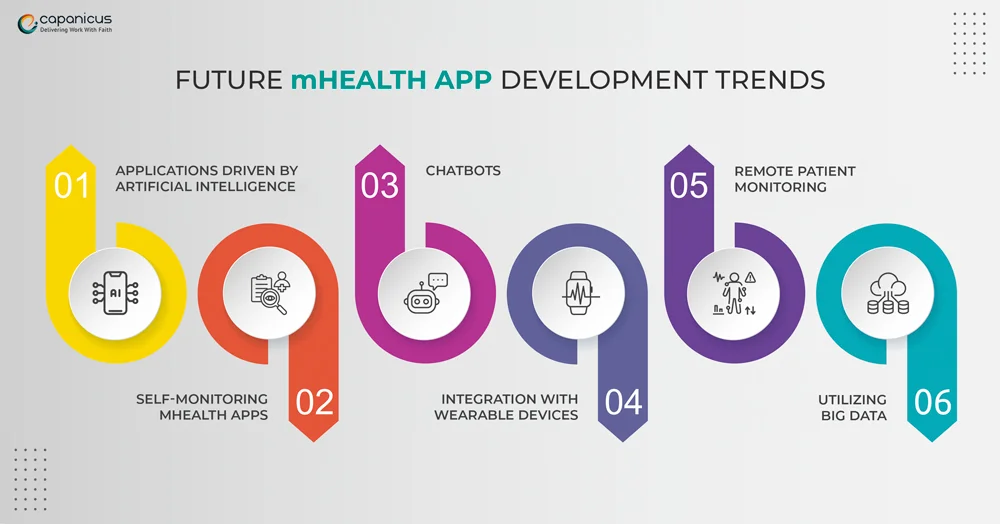
Technology is advancing on a constant basis, and healthcare apps have to adapt accordingly. The use of these prominent mHealth App Development trends is likely to become widespread in the near future.
Applications Driven by Artificial Intelligence
Artificial intelligence is a major software development trend that is here to stay. Its use will become more pronounced in the future. Integrating AI with the technology of mobile health apps can resolve significant problems. For this reason, AI-driven mHealth apps will become faster, more precise, and affordable.
Self-Monitoring mHealth Apps
The trend of self-monitoring is expected to grow phenomenally in the coming years. The mobile healthcare apps enable patients to detect symptoms of certain diseases. Moreover, these apps can be connected to wearable devices to identify patients’ signs accurately and quickly.
Chatbots
Medical chatbots are one of the principal healthcare trends. Though this technology was developed to offer assistance to healthcare experts, integrating it with health apps can improve their efficiency and usefulness for patients.
Integration with Wearable Devices
Health devices like fitness trackers and smartwatches are increasingly being integrated with apps in the field of patient care today. These devices collect health-related data. This includes activity levels of individual patients and their heart rate and sleep patterns. The integration of these devices with mobile-based healthcare applications provides medical practitioners with key insights about patients’ conditions. Moreover, they enable users to easily manage their well-being.
Remote Patient Monitoring
Remote patient monitoring, or RPM, is one of the top healthcare technology-related trends. It enables medical practitioners to supervise their patients’ vital signs in real-time through home health equipment or mobile devices used by them.
Utilizing Big Data
Big Data-powered mobile healthcare apps can revolutionize the healthcare industry. These apps generate huge amounts of data. The structured and unstructured data provided by them can help users make relevant medical decisions. Moreover, the data can be utilized for enhanced health innovations.
Do you also want to embrace the present and future of healthcare driven by mobile healthcare apps to gain various benefits? These can include streamlining your healthcare operations, improving your patient engagement, and enhancing healthcare outcomes in patients. But they are not the only ones. Then embark on your custom healthcare mobile app building journey by partnering with Capanicus. We are a reliable and expert mHealth Development Company with prolific experience in building innovative and transformational apps and systems for a multitude of industries. Discuss your needs with us today to get started!









